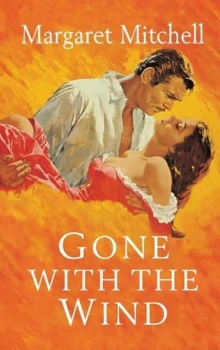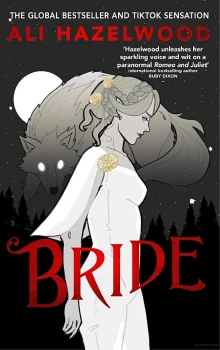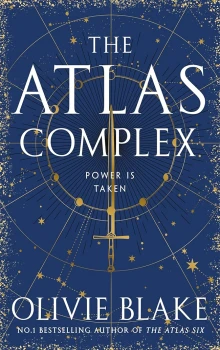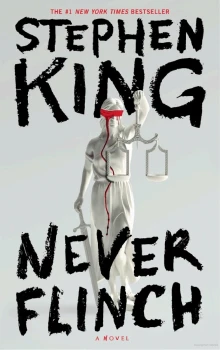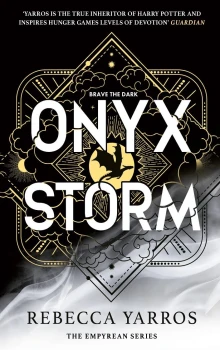-three
IT WAS ONE OF THOSE RARE DECEMBER DAYS when the sun was almost as
warm as Indian summer. Dry red leaves still clung to the oak in Aunt Pitty’s
yard and a faint yellow green still persisted in the dying grass. Scarlett, with
the baby in her arms, stepped out onto the side porch and sat down in a
rocking chair in a patch of sunshine. She was wearing a new green challis
dress trimmed with yards and yards of black rickrack braid and a new lace
house cap which Aunt Pitty had made for her. Both were very becoming to
her and she knew it and took great pleasure in them. How good it was to
look pretty again after the long months of looking so dreadful!
As she sat rocking the baby and humming to herself, she heard the
sound of hooves coming up the side street and, peering curiously through
the tangle of dead vines on the porch, she saw Rhett Butler riding toward
the house.
He had been away from Atlanta for months, since just after Gerald died,
since long before Ella Lorena was born. She had missed him but she now
wished ardently that there was some way to avoid seeing him. In fact, the
sight of his dark face brought a feeling of guilty panic to her breast. A
matter in which Ashley was concerned lay on her conscience and she did
not wish to discuss it with Rhett, but she knew he would force the
discussion, no matter how disinclined she might be.
He drew up at the gate and swung lightly to the ground and she
thought, staring nervously at him, that he looked just like an illustration in
a book Wade was always pestering her to read aloud.
“All he needs is earrings and a cutlass between his teeth,” she thought.
“Well, pirate or no, he’s not going to cut my throat today if I can help it.”
As he came up the walk she called a greeting to him, summoning her
sweetest smile. How lucky that she had on her new dress and the becoming
cap and looked so pretty! As his eyes went swiftly over her, she knew he
thought her pretty, too.
“A new baby! Why, Scarlett, this is a surprise!” he laughed, leaning
down to push the blanket away from Ella Lorena’s small ugly face.
“Don’t be silly,” she said, blushing. “How are you, Rhett? You’ve been
away a long time.”
“So I have. Let me hold the baby, Scarlett. Oh, I know how to hold
babies. I have many strange accomplishments. Well, he certainly looks like
Frank. All except the whiskers, but give him time.”
“I hope not. It’s a girl.”
“A girl? That’s better still. Boys are such nuisances. Don’t ever have any
more boys, Scarlett.”
It was on the tip of her tongue to reply tartly that she never intended to
have any more babies, boys or girls, but she caught herself in time and
smiled, casting about quickly in her mind for some topic of conversation
that would put off the bad moment when the subject she feared would
come up for discussion.
“Did you have a nice trip, Rhett? Where did you go this time?”
“Oh—Cuba—New Orleans—other places. Here, Scarlett, take the baby.
She’s beginning to slobber and I can’t get to my handkerchief. She’s a fine
baby, I’m sure, but she’s wetting my shirt bosom.”
She took the child back into her lap and Rhett settled himself lazily on
the banister and took a cigar from a silver case.
“You are always going to New Orleans,” she said and pouted a little.
“And you never will tell me what you do there.”
“I am a hard-working man, Scarlett, and perhaps my business takes me
there.”
“Hard-working! You!” she laughed impertinently. “You never worked in
your life. You’re too lazy. All you ever do is finance Carpetbaggers in their
thieving and take half the profits and bribe Yankee officials to let you in on
schemes to rob us taxpayers.”
He threw back his head and laughed.
“And how you would love to have money enough to bribe officials, so
you could do likewise!”
“The very idea—” She began to ruffle.
“But perhaps you will make enough money to get into bribery on a large
scale some day. Maybe you’ll get rich off those convicts you leased.”
“Oh,” she said, a little disconcerted, “how did you find out about my
gang so soon?”
“I arrived last night and spent the evening in the Girl of the Period
Saloon, where one hears all the news of the town. It’s a clearing house for
gossip. Better than a ladies’ sewing circle. Everyone told me that you’d
leased a gang and put that little plug-ugly, Gallegher, in charge to work
them to death.”
“That’s a lie,” she said angrily. “He won’t work them to death. I’ll see to
that.”
“Will you?”
“Of course I will! How can you even insinuate such things?”
“Oh, I do beg your pardon, Mrs. Kennedy! I know your motives are
always above reproach. However, Johnnie Gallegher is a cold little bully if I
ever saw one. Better watch him or you’ll be having trouble when the
inspector comes around.”
“You tend to your business and I’ll tend to mine,” she said indignantly.
“And I don’t want to talk about convicts any more. Everybody’s been
hateful about them. My gang is my own business— And you haven’t told
me yet what you do in New Orleans. You go there so often that everybody
says—” She paused. She had not intended to say so much.
“What do they say?”
“Well—that you have a sweetheart there. That you are going to get
married. Are you, Rhett?”
She had been curious about this for so long that she could not refrain
from asking the point-blank question. A queer little pang of jealousy
jabbed at her at the thought of Rhett getting married, although why that
should be she did not know.
His bland eyes grew suddenly alert and he caught her gaze and held it
until a little blush crept up into her cheeks.
“Would it matter much to you?”
“Well, I should hate to lose your friendship,” she said primly and, with
an attempt at disinterestedness, bent down to pull the blanket closer about
Ella Lorena’s head.
He laughed suddenly, shortly, and said: “Look at me, Scarlett.”
She looked up unwillingly, her blush deepening.
“You can tell your curious friends that when I marry it will be because I
couldn’t get the woman I wanted in any other way. And I’ve never yet
wanted a woman bad enough to marry her.”
Now she was indeed confused and embarrassed, for she remembered the
night on this very porch during the siege when he had said: “I am not a
marrying man” and casually suggested that she become his mistress—
remembered, too, the terrible day when he was in jail and was shamed by
the memory. A slow malicious smile went over his face as he read her eyes.
“But I will satisfy your vulgar curiosity since you ask such pointed
questions. It isn’t a sweetheart that takes me to New Orleans. It’s a child, a
little boy.”
“A little boy!” The shock of this unexpected information wiped out her
confusion.
“Yes, he is my legal ward and I am responsible for him. He’s in school in
New Orleans. I go there frequently to see him.”
“And take him presents?” So, she thought, that’s how he always knows
what kind of presents Wade likes!
“Yes,” he said shortly, unwillingly.
“Well, I never! Is he handsome?”
“Too handsome for his own good.”
“Is he a nice little boy?”
“No. He’s a perfect hellion. I wish he had never been born. Boys are
troublesome creatures. Is there anything else you’d like to know?”
He looked suddenly angry and his brow was dark, as though he already
regretted speaking of the matter at all.
“Well, not if you don’t want to tell me any more,” she said loftily,
though she was burning for further information. “But I just can’t see you in
the role of a guardian,” and she laughed, hoping to disconcert him.
“No, I don’t suppose you can. Your vision is pretty limited.”
He said no more and smoked his cigar in silence for a while. She cast
about for some remark as rude as his but could think of none.
“I would appreciate it if you’d say nothing of this to anyone,” he said
finally. “Though I suppose that asking a woman to keep her mouth shut is
asking the impossible.”
“I can keep a secret,” she said with injured dignity.
“Can you? It’s nice to learn unsuspected things about friends. Now, stop
pouting, Scarlett. I’m sorry I was rude but you deserved it for prying. Give
me a smile and let’s be pleasant for a minute or two before I take up an
unpleasant subject.”
“Oh, dear!” she thought. “Now, he’s going to talk about Ashley and the
mill!” and she hastened to smile and show her dimple to divert him.
“Where else did you go, Rhett? You haven’t been in New Orleans all this
time, have you?”
“No, for the last month I’ve been in Charleston. My father died.”
“Oh, I’m sorry.”
“Don’t be. I’m sure he wasn’t sorry to die, and I’m sure I’m not sorry he’s
dead.”
“Rhett, what a dreadful thing to say!”
“It would be much more dreadful if I pretended to be sorry, when I
wasn’t, wouldn’t it? There was never any love lost between us. I cannot
remember when the old gentleman did not disapprove of me. I was too
much like his own father and he disapproved heartily of his father. And as I
grew older his disapproval of me became downright dislike, which, I admit,
I did little to change. All the things Father wanted me to do and be were
such boring things. And finally he threw me out into the world without a
cent and no training whatsoever to be anything but a Charleston
gentleman, a good pistol shot and an excellent poker player. And he
seemed to take it as a personal affront that I did not starve but put my
poker playing to excellent advantage and supported myself royally by
gambling. He was so affronted at a Butler becoming a gambler that when I
came home for the first time, he forbade my mother to see me. And all
during the war when I was blockading out of Charleston, Mother had to lie
and slip off to see me. Naturally that didn’t increase my love for him.”
“Oh, I didn’t know all that!”
“He was what is pointed out as a fine old gentleman of the old school
which means that he was ignorant, thick headed, intolerant and incapable
of thinking along any lines except what other gentlemen of the old school
thought. Everyone admired him tremendously for having cut me off and
counted me as dead. ‘If thy right eye offend thee, pluck it out.’ I was his
right eye, his oldest son, and he plucked me out with a vengeance.”
He smiled a little, his eyes hard with amused memory.
“Well, I could forgive all that but I can’t forgive what he’s done to
Mother and my sister since the war ended. They’ve been practically
destitute. The plantation house was burned and the rice fields have gone
back to marsh lands. And the town house went for taxes and they’ve been
living in two rooms that aren’t fit for darkies. I’ve sent money to Mother,
but Father has sent it back—tainted money, you see!—and several times
I’ve gone to Charleston and given money, on the sly, to my sister. But
Father always found out and raised merry hell with her, till her life wasn’t
worth living, poor girl. And back the money came to me. I don’t know how
they’ve lived…. Yes, I do know. My brother’s given what he could, though
he hasn’t much to give and he won’t take anything from me either—
speculator’s money is unlucky money, you see! And the charity of their
friends. Your Aunt Eulalie, she’s been very kind. She’s one of Mother’s best
friends, you know. She’s given them clothes and— Good God! My mother
on charity!”
It was one of the few times she had ever seen him with his mask off, his
face hard with honest hatred for his father and distress for his mother.
“Aunt ’Lalie! But, good Heavens, Rhett, she hasn’t got anything much
above what I send her!”
“Ah, so that’s where it comes from! How ill bred of you, my dear, to brag
of such a thing in the face of my humiliation. You must let me reimburse
you!”
“With pleasure,” said Scarlett, her mouth suddenly twisting into a grin,
and he smiled back.
“Ah, Scarlett, how the thought of a dollar does make your eyes sparkle!
Are you sure you haven’t some Scotch or perhaps Jewish blood as well as
Irish?”
“Don’t be hateful! I didn’t mean to throw it in your face about Aunt
’Lalie. But honestly, she thinks I’m made of money. She’s always writing me
for more and, God knows, I’ve got enough on my hands without supporting
all of Charleston. What did your father die of?”
“Genteel starvation, I think—and hope. It served him right. He was
willing to let Mother and Rosemary starve with him. Now that he’s dead, I
can help them. I’ve bought them a house on the Battery and they’ve
servants to look after them. But of course, they couldn’t let it be known
that the money came from me.”
“Why not?”
“My dear, surely you know Charleston! You’ve visited there. My family
may be poor but they have a position to uphold. And they couldn’t uphold
it if it were known that gambling money and speculator’s money and
Carpetbag money was behind it. No, they gave it out that Father left an
enormous life insurance—that he’d beggared himself and starved himself to
death to keep up the payments, so that after he died, they’d be provided for.
So he is looked upon as an even greater gentleman of the old school than
before…. In fact, a martyr to his family. I hope he’s turning in his grave at
the knowledge that Mother and Rosemary are comfortable now, in spite of
his efforts…. In a way, I’m sorry he’s dead because he wanted to die—was so
glad to die.”
“Why?”
“Oh, he really died when Lee surrendered. You know the type. He never
could adjust himself to the new times and spent his time talking about the
good old days.”
“Rhett, are all old folks like that?” She was thinking of Gerald and what
Will had said about him.
“Heavens, no! Just look at your Uncle Henry and that old wild cat, Mr.
Merriwether, just to name two. They took a new lease on life when they
marched out with the Home Guard and it seems to me that they’ve gotten
younger and more peppery ever since. I met old man Merriwether this
morning driving René’s pie wagon and cursing the horse like an army mule
skinner. He told me he felt ten years younger since he escaped from the
house and his daughter-in-law’s coddling and took to driving the wagon.
And your Uncle Henry enjoys fighting the Yankees in court and out and
defending the widow and the orphan—free of charge, I fear—against the
Carpetbaggers. If there hadn’t been a war, he’d have retired long ago and
nursed his rheumatism. They’re young again because they are of use again
and feel that they are needed. And they like this new day that gives old
men another chance. But there are plenty of people, young people, who
feel like my father and your father. They can’t and won’t adjust and that
brings me to the unpleasant subject I want to discuss with you, Scarlett.”
His sudden shift so disconcerted her that she stammered: “What—what
—” and inwardly groaned: “Oh, Lord! Now it’s coming. I wonder if I can
butter him down?”
“I shouldn’t have expected either truth or fair dealing from you,
knowing you as I do. But foolishly, I trusted you.”
“I don’t know what you mean.”
“I think you do. At any rate, you look very guilty. As I was riding along
Ivy Street a while ago, on my way to call on you, who should hail me from
behind a hedge but Mrs. Ashley Wilkes! Of course, I stopped and chatted
with her.”
“Indeed?”
“Yes, we had an enjoyable talk. She told me she had always wanted to
let me know how brave she thought I was to have struck a blow for the
Confederacy, even at the eleventh hour.”
“Oh, fiddle-dee-dee! Melly’s a fool. She might have died that night
because you acted so heroic.”
“I imagine she would have thought her life given in a good cause. And
when I asked her what she was doing in Atlanta she looked quite surprised
at my ignorance and told me that they were living here now and that you
had been kind enough to make Mr. Wilkes a partner in your mill.”
“Well, what of it?” questioned Scarlett, shortly.
“When I lent you the money to buy that mill I made one stipulation, to
which you agreed, and that was that it should not go to the support of
Ashley Wilkes.”
“You are being very offensive. I’ve paid you back your money and I own
the mill and what I do with it is my own business.”
“Would you mind telling me how you made the money to pay back my
loan?”
“I made it selling lumber, of course.”
“You made it with the money I lent you to give you your start. That’s
what you mean. My money is being used to support Ashley. You are a
woman quite without honor and if you hadn’t repaid my loan, I’d take great
pleasure in calling it in now and selling you out at public auction if you
couldn’t pay.”
He spoke lightly but there was anger flickering in his eyes.
Scarlett hastily carried the warfare into the enemy’s territory.
“Why do you hate Ashley so much? I believe you’re jealous of him.”
After she had spoken she could have bitten her tongue, for he threw
back his head and laughed until she went red with mortification.
“Add conceit to dishonor,” he said. “You’ll never get over being the
belle of the County will you? You’ll always think you’re the cutest little
trick in shoe leather and that every man you meet is expiring for love of
you.”
“I don’t either!” she cried hotly. “But I just can’t see why you hate
Ashley so much and that’s the only explanation I can think of.”
“Well, think something else, pretty charmer, for that’s the wrong
explanation. And as for hating Ashley— I don’t hate him any more than I
like him. In fact, my only emotion toward him and his kind is pity.”
“Pity?”
“Yes, and a little contempt. Now, swell up like a gobbler and tell me that
he is worth a thousand blackguards like me and that I shouldn’t dare be so
presumptuous as to feel either pity or contempt for him. And when you
have finished swelling, I’ll tell you what I mean, if you’re interested.”
“Well, I’m not.”
“I shall tell you, just the same, for I can’t bear for you to go on nursing
your pleasant delusion of my jealousy. I pity him because he ought to be
dead and he isn’t. And I have a contempt for him because he doesn’t know
what to do with himself now that his world is gone.”
There was something familiar in the idea he expressed. She had a
confused memory of having heard similar words but she could not
remember when and where. She did not think very hard about it for her
anger was hot.
“If you had your way all the decent men in the South would be dead!”
“And if they had their way, I think Ashley’s kind would prefer to be
dead. Dead with neat stones above them, saying: ‘Here lies a soldier of the
Confederacy, dead for the Southland’ or ‘Dulce et decorum est—’ or any of
the other popular epitaphs.”
“I don’t see why!”
“You never see anything that isn’t written in letters a foot high and then
shoved under your nose, do you? If they were dead, their troubles would be
over, there’d be no problems to face, problems that have no solutions.
Moreover, their families would be proud of them through countless
generations. And I’ve heard the dead are happy. Do you suppose Ashley
Wilkes is happy?”
“Why, of course—” she began and then she remembered the look in
Ashley’s eyes recently and stopped.
“Is he happy or Hugh Elsing or Dr. Meade? Any more than my father
and your father were happy?”
“Well, perhaps not as happy as they might be, because they’ve all lost
their money.”
He laughed.
“It isn’t losing their money, my pet. I tell you it’s losing their world—the
world they were raised in. They’re like fish out of water or cats with wings.
They were raised to be certain persons, to do certain things, to occupy
certain niches. And those persons and things and niches disappeared
forever when General Lee arrived at Appomattox. Oh, Scarlett, don’t look
so stupid! What is there for Ashley Wilkes to do, now that his home is
gone and his plantation taken up for taxes and fine gentlemen are going
twenty for a penny? Can he work with his head or his hands? I’ll bet you’ve
lost money hand over fist since he took over that mill.”
“I have not!”
“How nice. May I look over your books some Sunday evening when you
are at leisure?”
“You can go to the devil and not at your leisure. You can go now, for all I
care.”
“My pet, I’ve been to the devil and he’s a very dull fellow. I won’t go
there again, even for you…. You took my money when you needed it
desperately and you used it. We had an agreement as to how it should be
used and you have broken that agreement. Just remember, my precious
little cheat, the time will come when you will want to borrow more money
from me. You’ll want me to bank you, at some incredibly low interest, so
you can buy more mills and more mules and build more saloons. And you
can whistle for the money.”
“When I need money I’ll borrow it from the bank, thank you,” she said
coldly, but her breast was heaving with rage.
“Will you? Try to do it. I own plenty of stock in the bank.”
“You do?”
“Yes, I am interested in some honest enterprises.”
“There are other banks—”
“Plenty of them. And if I can manage it, you’ll play hell getting a cent
from any of them. You can go to the Carpetbag usurers if you want money.”
“I’ll go to them with pleasure.”
“You’ll go but with little pleasure when you learn their rates of interest.
My pretty, there are penalties in the business world for crooked dealing.
You should have played straight with me.”
“You’re a fine man, aren’t you? So rich and powerful yet picking on
people who are down, like Ashley and me!”
“Don’t put yourself in his class. You aren’t down. Nothing will down
you. But he is down and he’ll stay there unless there’s some energetic
person behind him, guiding and protecting him as long as he lives. I’m of
no mind to have my money used for the benefit of such a person.”
“You didn’t mind helping me and I was down and—”
“You were a good risk, my dear, an interesting risk. Why? Because you
didn’t plump yourself down on your male relatives and sob for the old days.
You got out and hustled and now your fortunes are firmly planted on money
stolen from a dead man’s wallet and money stolen from the Confederacy.
You’ve got murder to your credit, and husband stealing, attempted
fornication, lying and sharp dealing and any amount of chicanery that
won’t bear close inspection. Admirable things, all of them. They show you
to be a person of energy and determination and a good money risk. It’s
entertaining, helping people who help themselves. I’d lend ten thousand
dollars without even a note to that old Roman matron, Mrs. Merriwether.
She started with a basket of pies and look at her now! A bakery employing
half a dozen people, old Grandpa happy with his delivery wagon and that
lazy little Creole, René, working hard and liking it…. Or that poor devil,
Tommy Wellburn, who does two men’s work with half a man’s body and
does it well or—well, I won’t go on and bore you.”
“You do bore me. You bore me to distraction,” said Scarlett coldly,
hoping to annoy him and divert him from the ever-unfortunate subject of
Ashley. But he only laughed shortly and refused to take up the gauntlet.
“People like them are worth helping. But Ashley Wilkes—bah! His
breed is of no use or value in an upside-down world like ours. Whenever
the world upends, his kind is the first to perish. And why not? They don’t
deserve to survive because they won’t fight—don’t know how to fight. This
isn’t the first time the world’s been upside down and it won’t be the last. It’s
happened before and it’ll happen again. And when it does happen,
everyone loses everything and everyone is equal. And then they all start
again at taw, with nothing at all. That is, nothing except the cunning of
their brains and strength of their hands. But some people, like Ashley, have
neither cunning nor strength or, having them, scruple to use them. And so
they go under and they should go under. It’s a natural law and the world is
better off without them. But there are always a hardy few who come
through and, given time, they are right back where they were before the
world turned over.”
“You’ve been poor! You just said that your father turned you out without
a penny!” said Scarlett, furious. “I should think you’d understand and
sympathize with Ashley!”
“I do understand,” said Rhett, “but I’m damned if I sympathize. After
the surrender Ashley had much more than I had when I was thrown out.
At least, he had friends who took him in, whereas I was Ishmael. But what
has Ashley done with himself?”
“If you are comparing him with yourself, you conceited thing, why—
He’s not like you, thank God! He wouldn’t soil his hands as you do, making
money with Carpetbaggers and Scallawags and Yankees. He’s scrupulous
and honorable!”
“But not too scrupulous and honorable to take aid and money from a
woman.”
“What else could he have done?”
“Who am I to say? I only know what I did, both when I was thrown out
and nowadays. I only know what other men have done. We saw
opportunity, some honestly, some shadily, and we are still making the most
of it. But the Ashleys of this world have the same chances and don’t take
them. They just aren’t smart, Scarlett, and only the smart deserve to
survive.”
She hardly heard what he was saying, for now there was coming back to
her the exact memory which had teased her a few minutes before when he
first began speaking. She remembered the cold wind that swept the orchard
of Tara and Ashley standing by a pile of rails, his eyes looking beyond her.
And he said—what? Some funny foreign word that sounded like profanity
and had talked of the end of the world. She had not known what he meant
then but now bewildered comprehension was coming to her and with it a
sick, weary feeling.
“Why, Ashley said—”
“Yes?”
“Once at Tara he said something about the—a—dusk of the gods and
about the end of the world and some such foolishness.”
“Ah, the Götterdämmerung!” Rhett’s eyes were sharp with interest.
“And what else?”
“Oh, I don’t remember exactly. I wasn’t paying much mind. But—yes—
something about the strong coming through and the weak being winnowed
out.”
“Ah, so he knows. Then that makes it harder for him. Most of them
don’t know and will never know. They’ll wonder all their lives where the
lost enchantment has vanished. They’ll simply suffer in proud and
incompetent silence. But he understands. He knows he’s winnowed out.”
“Oh, he isn’t! Not while I’ve got breath in my body.”
He looked at her quietly and his brown face was smooth.
“Scarlett, how did you manage to get his consent to come to Atlanta
and take over the mill? Did he struggle very hard against you?”
She had a quick memory of the scene of Ashley after Gerald’s funeral
and put it from her.
“Why, of course not,” she replied indignantly. “When I explained to him
that I needed his help because I didn’t trust that scamp who was running
the mill and Frank was too busy to help me and I was going to—well, there
was Ella Lorena, you see. He was very glad to help me out.”
“Sweet are the uses of motherhood! So that’s how you got around him.
Well, you’ve got him where you want him now, poor devil, as shackled to
you by obligations as any of your convicts are by their chains. And I wish
you both joy. But, as I said at the beginning of this discussion, you’ll never
get another cent out of me for any of your little unladylike schemes, my
double-dealing lady.”
She was smarting with anger and with disappointment as well. For some
time she had been planning to borrow more money from Rhett to buy a lot
downtown and start a lumber yard there.
“I can do without your money,” she cried. “I’m making money out of
Johnnie Gallegher’s mill, plenty of it, now that I don’t use free darkies and I
have some money out on mortgages and we are coining cash at the store
from the darky trade.”
“Yes, so I heard. How clever of you to rook the helpless and the widow
and the orphan and the ignorant! But if you must steal, Scarlett, why not
steal from the rich and strong instead of the poor and weak? From Robin
Hood on down to now, that’s been considered highly moral.”
“Because,” said Scarlett shortly, “it’s a sight easier and safer to steal—as
you call it—from the poor.”
He laughed silently, his shoulders shaking.
“You’re a fine honest rogue, Scarlett!”
A rogue! Queer that that term should hurt. She wasn’t a rogue, she told
herself vehemently. At least, that wasn’t what she wanted to be. She
wanted to be a great lady. For a moment her mind went swiftly down the
years and she saw her mother, moving with a sweet swish of skirts and a
faint fragrance of sachet, her small busy hands tireless in the service of
others, loved, respected, cherished. And suddenly her heart was sick.
“If you are trying to devil me,” she said tiredly, “it’s no use. I know I’m
not as—scrupulous as I should be these days. Not as kind and as pleasant as
I was brought up to be. But I can’t help it, Rhett. Truly, I can’t. What else
could I have done? What would have happened to me, to Wade, to Tara
and all of us if I’d been—gentle when that Yankee came to Tara? I should
have been—but I don’t even want to think of that. And when Jonas
Wilkerson was going to take the home place, suppose I’d been—kind and
scrupulous? Where would we all be now? And if I’d been sweet and simple
minded and not nagged Frank about bad debts we’d—oh, well. Maybe I am
a rogue, but I won’t be a rogue forever, Rhett. But during these past years—
and even now—what else could I have done? How else could I have acted?
I’ve felt that I was trying to row a heavily loaded boat in a storm. I’ve had
so much trouble just trying to keep afloat that I couldn’t be bothered about
things that didn’t matter, things I could part with easily and not miss, like
good manners and—well, things like that. I’ve been too afraid my boat
would be swamped and so I’ve dumped overboard the things that seemed
least important.”
“Pride and honor and truth and virtue and kindliness,” he enumerated
silkily. “You are right, Scarlett. They aren’t important when a boat is
sinking. But look around you at your friends. Either they are bringing their
boats ashore safely with cargoes intact or they are content to go down with
all flags flying.”
“They are a passel of fools,” she said shortly. “There’s a time for all
things. When I’ve got plenty of money, I’ll be nice as you please, too.
Butter won’t melt in my mouth. I can afford to be then.”
“You can afford to be—but you won’t. It’s hard to salvage jettisoned
cargo and, if it is retrieved, it’s usually irreparably damaged. And I fear that
when you can afford to fish up the honor and virtue and kindness you’ve
thrown overboard, you’ll find they have suffered a sea change and not, I
fear, into something rich and strange…. ”
He rose suddenly and picked up his hat.
“You are going?”
“Yes. Aren’t you relieved? I leave you to what remains of your
conscience.”
He paused and looked down at the baby, putting out a finger for the
child to grip.
“I suppose Frank is bursting with pride?”
“Oh, of course.”
“Has a lot of plans for this baby, I suppose?”
“Oh, well, you know how silly men are about their babies.”
“Then, tell him,” said Rhett and stopped short, an odd look on his face,
“tell him if he wants to see his plans for his child work out, he’d better stay
home at night more often than he’s doing.”
“What do you mean?”
“Just what I say. Tell him to stay home.”
“Oh, you vile creature! To insinuate that poor Frank would—”
“Oh, good Lord!” Rhett broke into a roar of laughter. “I didn’t mean he
was running around with women! Frank! Oh, good Lord!”
He went down the steps still laughing.
